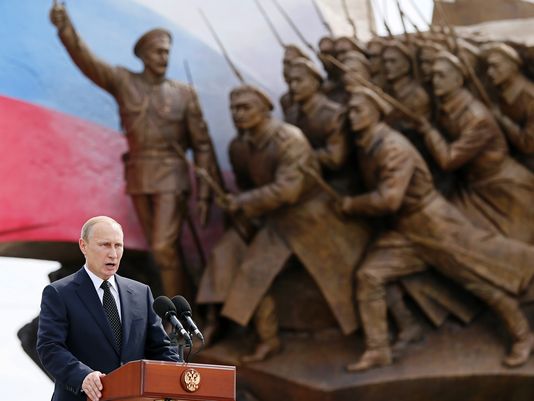Profile Hints at Putin Mindset
Profile Hints at Putin Mindset
Russian president’s ambitious nature means he’ll never let West get ahead of him

Russian President Vladimir Putin speaks Friday, Aug. 1, 2014 at the opening ceremony of the monument to the Heroes of World War I, behind him, on the day of the 100th anniversary of its beginning in Victory Park on Poklonnaya Hill in Moscow, Russia. (Photo credit: AP via St. Cloud Times)
By Joe Trenzeluk
St. Cloud Times
August 3, 2014
On July 17, 298 innocent victims were killed when Malaysia Airlines Flight MH17 was shot down over Ukraine. As attempts to investigate the incident continue, international pressure has been placed on Russian President Vladimir Putin because it is believed the Russian military supplied Ukrainian pro-Russia separatists with the Buk surface-to-air missiles that downed the airliner.
Putin issued a statement that Russia will do “everything in its power” to assist with the investigation and offered his condolences to people who lost loved ones in the tragedy.
If Putin’s role in the current crisis in Ukraine, his relations with the Syrian regime and pro-Assad Iran, and ongoing reports of human rights violations in Russia are not enough to call into question Putin’s character and leadership qualities, the downing of Flight MH17 certainly has.
Empirical analysis of Putin’s personality at the College of St. Benedict and St. John’s University’s Unit for the Study of Personality in Politics reveals that Putin is a highly dominant, narcissistic leader with secondary features of high conscientiousness and substantial introversion.
In a nutshell, leaders of this kind may be labeled “ambitious (or expansionist) hostile enforcers.”
Identifying the personality configuration of political leaders matters because personality points to stable, enduring patterns in a person’s motives, thoughts, and actions over time and across situations. Thus, accurate personality assessment allows us to anticipate a leader’s response to a broad range of contingencies.
Expansionist leader
In terms of foreign policy role orientation, the “high-dominance introvert” facet of Putin’s personality parallels what political psychologist Margaret Hermann has labeled an expansionist leader. Expansionists, like Adolf Hitler or Saddam Hussein, see the world as being “divided into ‘us’ and ‘them,’ ” based on a belief system in which conflict is viewed as inherent in the international system.
This worldview prompts a personal political style characterized by a “wariness of others’ motives” and a directive, controlling interpersonal orientation, resulting in a foreign policy “focused on issues of security and status,” favoring “low-commitment actions” and espousing “short-term, immediate change in the international arena.”
Expansionist leaders, according to Hermann, “are not averse to using the ‘enemy’ as a scapegoat,” and their rhetoric often may be “hostile in tone.”
Other common characteristics of expansionists include a high degree of power motivation, strong nationalism, an unwavering belief in one’s ability to control events, supreme self-confidence, distrust of others, and a very goal-directed level of task orientation — all of which are evident to varying degrees in Putin’s personality profile.
Putin is Russia
Putin believes the world is divided between his Russia and the West, often using “the West” or “democracy” as a scapegoat for his problems. Rising through the KGB and Russia’s political elite, he entwined himself with the history of Russia. Typical of narcissistic leaders with exalted self-concept and dreams of glory, he views his destiny and that of the Russian state as one and the same. Putin is Russia; Russia is Putin.
Although Putin shows no discernible signs of contemplating genocide or waging conventional war — sensation-seeking adventurousness ranks relatively low in his overall personality profile — he displays a desire for control and deeply entrenched feelings of resentment toward the West.
His world is a zero-sum game in which any gains by the West or by domestic opponents are considered moral threats to his power.
This is the opinion of Joe Trenzeluk, Inver Grove Heights, a junior psychology major at the College of St. Benedict and St. John’s University, where he is a summer research fellow in the Unit for the Study of Personality in Politics, directed by Aubrey Immelman.










Follow Aubrey Immelman